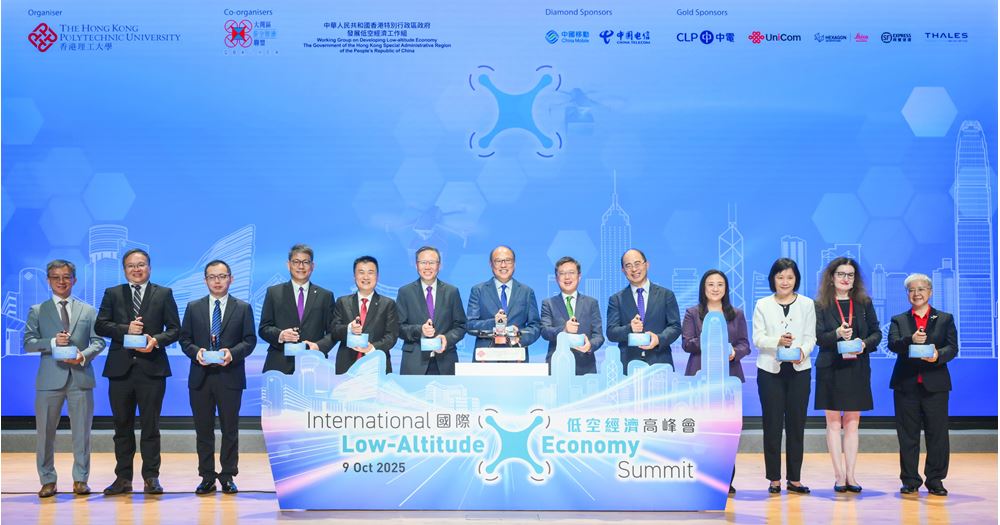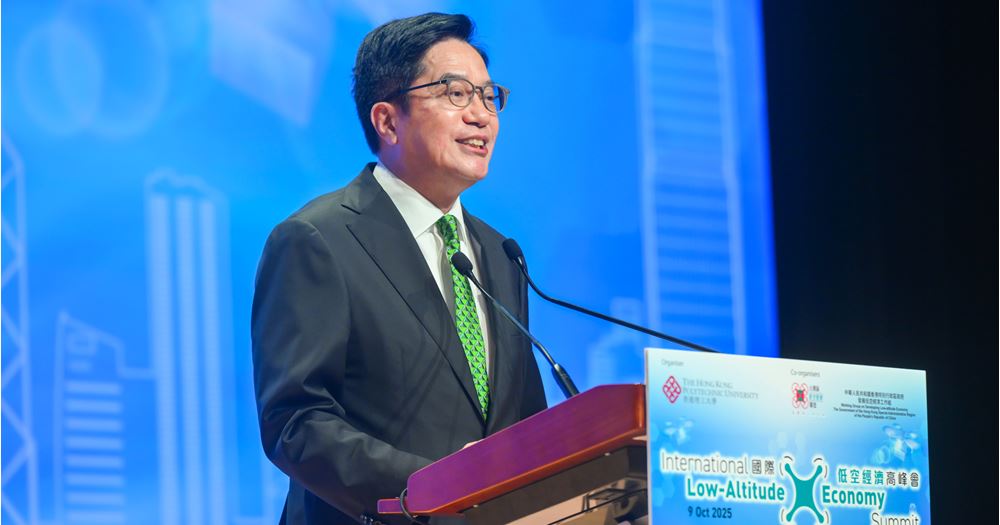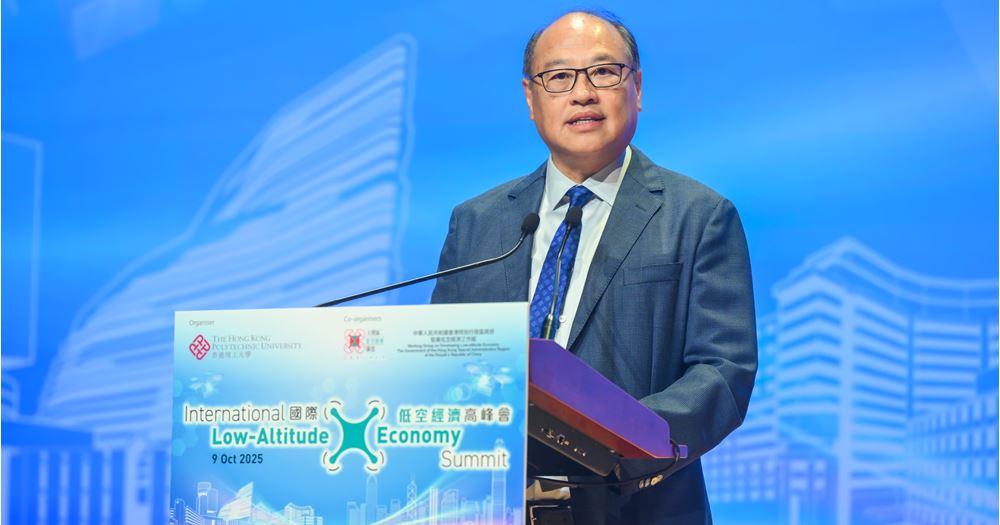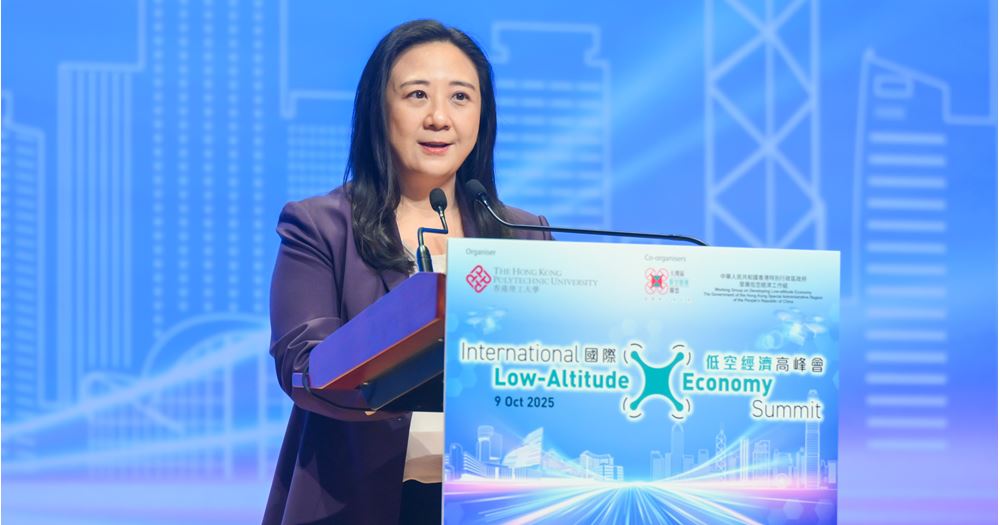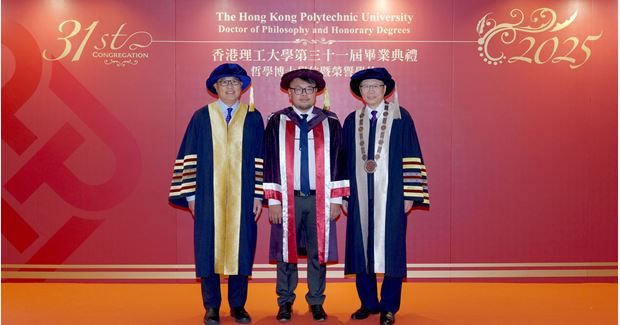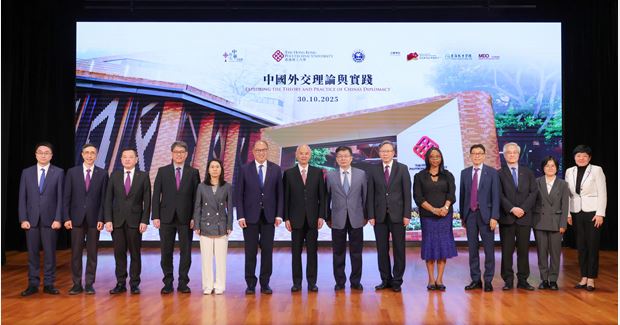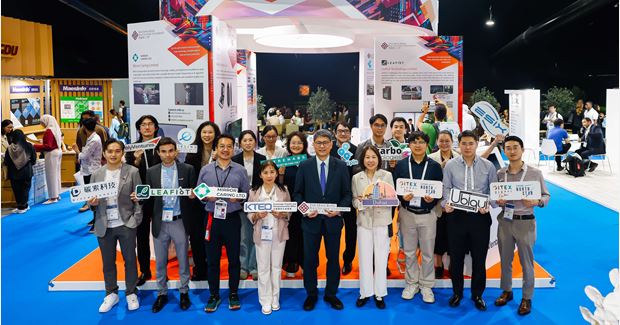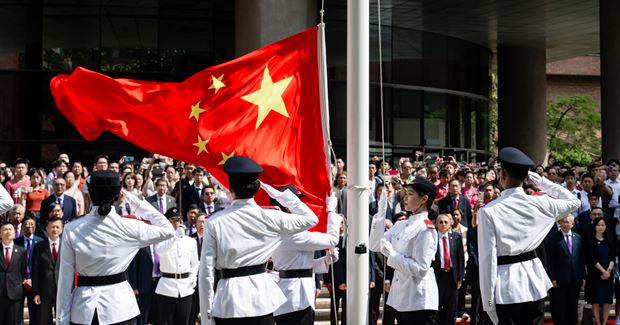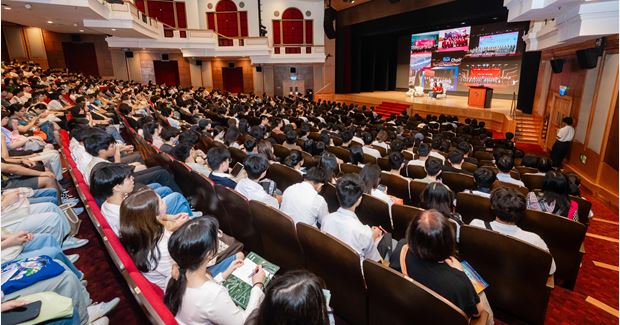PolyU hosts International Low-Altitude Economy Summit, gathering global leaders from government, industry, academia and research to power development of low-altitude economy ecosystem
9 Oct 2025
Organised by The Hong Kong Polytechnic University (PolyU), and co-organised by the Hong Kong Special Administrative Region (HKSAR) Government Working Group on Developing Low-altitude Economy and the Greater Bay Area Low Altitude Economy Alliance (LAEA), the International Low-Altitude Economy Summit (the Summit) was held today at PolyU. The Summit brought together local, Chinese Mainland and overseas representatives from government, industry, academia and research sectors to share forward-looking insights into a range of key topics, that spanned low-altitude airspace management policies, research and development of innovative technologies, industry development models and urban applications, while also showcasing numerous innovations in related technologies. The full-day event attracted over 1,200 government and business leaders, scholars, industry experts and public, demonstrating Hong Kong’s unique strengths in standards, regulation, and alignment with international practices.
The opening took place at the Jockey Club Auditorium on the PolyU campus, and was attended by Mr Michael WONG Wai-lun, Deputy Financial Secretary of the HKSAR Government; Dr LAM Tai-fai, Council Chairman of PolyU; The Hon Elizabeth QUAT, Legislative Council Member of the HKSAR and Founding President of LAEA, Prof. Jin-Guang TENG, President of PolyU; Mr Kevin CHOI, Permanent Secretary for Transport and Logistics of the HKSAR Government; Mr Arthur LEE, Treasurer of PolyU; Prof. Wing-tak WONG, Deputy President and Provost of PolyU; Prof. Christopher CHAO, Senior Vice President (Research and Innovation) and Director of the Policy Research Centre for Innovation and Technology of PolyU.
In his opening address, Mr Michael Wong said, “The development of the low-altitude economy requires not only government effort but also the support of partners from various sectors. I am very pleased that PolyU is a close collaborator in this regard. The government is rapidly advancing the development of the low-altitude economy. Among the first batch of 38 Regulatory Sandbox pilot projects, 17 have already commenced, and another 11 are expected to be launched by the end of this month. In addition, next year, the advanced ‘Regulatory Sandbox X’ pilot projects will be introduced, covering more complex application scenarios such as cross-boundary routes and low-altitude passenger aircraft. The government will continue to refine the civil aviation legislation and regulatory framework while actively promoting the development of related infrastructure.”
Dr Lam Tai-fai remarked, “PolyU has been working hand-in-hand with the government and industry to promote the development of the regional low-altitude economy and to accelerate the establishment of the Greater Bay Area as an aviation and logistics hub. This Summit provides an excellent opportunity for in-depth exchanges among experts from the government, industry and academia across different regions. As an emerging industry strongly promoted at the national level, the low-altitude economy is regarded as a key driver for developing new quality productive forces. In light of this, PolyU earlier submitted recommendations for the Policy Address which proposed advancing Hong Kong’s low-altitude economy through measures in areas such as infrastructure development, regional collaboration, and civil service training. Leveraging our strengths in interdisciplinary research and higher education, PolyU will continue to work collaboratively with various sectors to help Hong Kong and the entire Greater Bay Area seize the opportunities in this emerging field.”
The Hon Elizabeth Quat said, “The low-altitude economy will bring revolutionary changes to transportation, logistics, public services, and different industries, creating numerous job opportunities and new direction for the younger generation. These changes will also bring the public an unprecedented level of convenience and efficiency. However, we still need joint efforts from the government and all sectors of society to safely develop the low-altitude economy. Collaboration among the government, industry, academia, research and investment sectors is essential to drive breakthroughs and promote innovation in policies, systems, regulations, and technology. The LAEA will continue to work together with cities across the Greater Bay Area and different stakeholders to help the region become a global pioneer and demonstration zone for the low-altitude economy. It will also play the roles of both ‘super connector’ and ‘super value-adder’, supporting the nation’s low-altitude economy in reaching out to the world.”
The first highlight of the Summit was a keynote speech by Dr BI Qi, Chief Scientist of China Telecom, with the theme “Building Intelligent Network for Flight Services to Release the Potential of Low Altitude Airspace Economy.” It was followed by two fireside chats. The first, moderated by Mr Kevin Choi, gathered officials from the Chinese Mainland, the European Union and Singapore, together with international enterprise representative to explore the policies and regulatory regime that support the low-altitude economy; the second, hosted by Prof. Christopher Chao and attended by scholars and industry leaders—including leading electric vertical take-off and landing and low-altitude systems developers—discussed how collaborative innovation across industry and academia can drive breakthroughs in and the translation of low-altitude flying and related technologies.

Dr Bi Qi, Chief Scientist of China Telecom, delivered a keynote speech, “Building Intelligent Network for Flight Services to Release the Potential of Low Altitude Airspace Economy”.
In the afternoon, the Summit featured four thematic parallel sessions. “Sandbox Project Progress Sharing” showcased the progress of ongoing Sandbox projects and highlighted the pilot outcomes, key challenges and policy recommendations. “UTM and UAV Technology” spotlighted research on infrastructure design for unmanned aircraft system traffic management (UTM), integration with manned airspace, unmanned aerial vehicle (UAV) technology and related safety mechanisms in the Greater Bay Area. “Policy and Regulation” discussed policy frameworks that foster low-altitude economy development, covering public–private collaboration models and regional integration. “Industry Forum” presented UAV innovations in hardware, software and systems, with live demonstrations and video showcases of their applications in public services.
Another highlight of the Summit, an Innovation and Technology Showcase was staged, where nearly 30 government departments, academic institutions and enterprises presented cutting-edge technology applications and the Regulatory Sandbox pilot projects. These included a sentry drone system for early warning of GNSS interference, 5G-connected drone technology, a 5G drone integrated management cloud platform, an AI-powered aerial intelligence drone platform, an advanced wireless charger for drones, an integrated real-time precise point positioning-real-time kinematic infrastructure for cross-border low-altitude positioning and navigation in the Greater Bay Area, and drone-assisted urban logistics systems.

An Innovation and Technology Showcase was staged during the Summit. Nearly 30 government departments, academic institutions and enterprises presented cutting-edge technology applications and the Regulatory Sandbox pilot projects. Prof. Hailong HUANG, Assistant Professor of Department of Aeronautical and Aviation Engineering and a core member Research Centre for Low Altitude Economy of PolyU, introduced some of the University’s innovations.
Providing all-round support for Hong Kong’s low-altitude economy development
PolyU is committed to providing comprehensive support for low-altitude economy development in Hong Kong—from technology innovation, knowledge transfer and policy recommendations to talent cultivation. Prof. Christopher Chao said, “The University last year established the Research Centre for Low Altitude Economy (RCLAE) to advance interdisciplinary research that drives technological advancements in the field, while its Policy Research Centre for Innovation and Technology has made policy recommendations to the HKSAR Government on various topics related to low-altitude economy. Meanwhile, PolyU is actively expanding its industry collaboration network, driving innovation and knowledge transfer in the low-altitude economy. PolyU also this year launched a MSc Programme in the Low-Altitude Economy to cultivate a variant talent pool for the sector.”

Prof. Christopher Chao (centre), The Hon Elizabeth Quat (left) and Prof. CHEN Wen-hua, Interim Head of Department of Aeronautical and Aviation Engineering, Chair Professor of Robotics and Autonomous System , and Director of the Research Centre for Low Altitude Economy of PolyU (right), attended the media briefing session.
Prof. Christopher Chao shared key PolyU initiatives and plans to help promote the low-altitude economy.
The International Low-Altitude Economy Summit demonstrated PolyU’s strong research capabilities, cross-sector collaboration network and advantages in knowledge transfer in the low-altitude economy field. It also showcased the thriving low-altitude economy ecosystem in Hong Kong and the Greater Bay Area, enhanced Hong Kong’s international influence in this field and gathered expert insights on multiple critical topics—making a significant step towards the vision of propelling Hong Kong as an Asia-Pacific hub for innovative low-altitude applications.
***END***
Press Contacts
Ms Hazel Cheng
Assistant Manager, Public Affairs
- 2766 4570
- hazel-sy.cheng@polyu.edu.hk
You may also like


